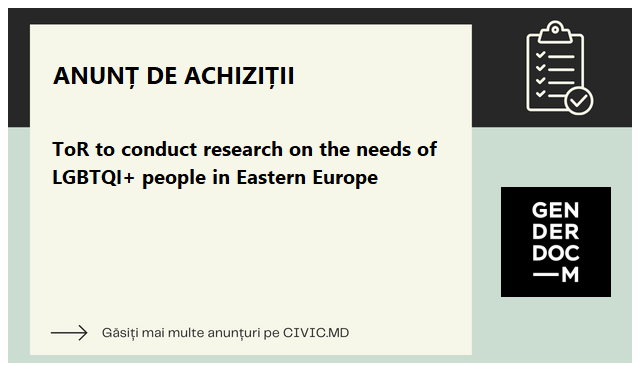ToR to conduct research on the needs of LGBTQI+ people in Eastern Europe

|
Objective of the assignment: |
Measuring and assessing needs of LGBTQI+ community in countries presented in the coalition |
|
Employing organization: |
Eastern European Coalition for LGBT+ Equality |
|
Duration of the assignment: |
March 25 – July 31, 2024 |
About the Eastern European Coalition for LGBT+ Equality
Founded in 2014, but legally registered in 2021, the Eastern European Coalition for LGBT+ Equality emerged as a collaborative effort among six prominent organizations from 5 countries, each representing vital LGBT+ initiatives in Ukraine, Moldova, Armenia, Russia, and Georgia. Our overarching project goal is to safeguard the security, fortify resilience, and foster sustainable development within local LGBT+ communities, while simultaneously fostering bridges of solidarity both within the Eastern European region and on the international stage.
Background
Taking into consideration a crisis and war in the region, LGBTQI+ people become one of the most vulnerable groups, suffering from inequality, lack of legal rights, marginalization, discrimination and violence. The current assignment seeks to conduct a needs assessment for the LGBTQI+ community, which will serve as a tool for driving social change and ensuring equal rights for all.
In their countries, all Coalition member organizations have solid expertise and build their interventions based on identified needs of community in the local context. However, in order to plan successful regional activities, it is necessary to find points of intersection in the needs and interests of communities and activist/volunteer groups in all countries. Based on a unified methodology, this research will serve as a tool to gather and analyze cross-cutting issues for communities from the 5 countries and propose relevant and adequate recommendations for future interventions.
Scope of work
The assigned consultant(s) are expected to develop the methodology of the needs assessment study, coordinate the online data collection in all targeted countries, produce a report of the research with recommendations on addressing common issues of communities from the 5 countries.
The needs assessment will consist of an online questionnaire, translated in each country’s language. It will be disseminated within the LGBT+ communities of each country with the help of the Coalition’s partner organizations. The responses will be translated into English, analyzed and a report will be developed, presenting the main findings of the study and outlining recommendations for potential regional activities based on the identified points of intersection. The consultant(s) are also expected to attend monthly meetings with the Coalition in order to report on the progress of the assignment.
Specific expected results:
Result 1: Identify the needs of the LGBTQI+ individuals from countries represented by the Coalition.
Result 2: Provide actionable recommendations for successful regional activities that would address the identified needs
Result 3: Deliver a final report and presentation showing the findings and recommendation of the study
Tasks/activities, timeline and deliverables
|
Tasks and activities: |
Deliverables |
Timeline |
|
Participation in working meetings, methodology development, survey design |
Research methodology; Survey questionnaire; Detailed timeline; |
Mar-Apr, 2024 |
|
Development of working plan for research assistant teams per country |
Fieldwork completed; Compiled and translated survey results. |
Apr-May, 2024 |
|
Data analysis, development of the first draft of the report |
Draft report with initial findings |
June, 2024 |
|
Finalize the report and develop the set of recommendations, deliver a presentation highlighting main findings to the Coalition |
Final report with relevant recommendations package; An online presentation of the findings and recommendations to all members of the Coalition |
July, 2024 |
Final report structure
Table of contents
Acronyms
Executive summary
- Overview of the study
- Methodology
- Most important findings and conclusions
- Main recommendations
I. Introduction
- Scope and purpose of the needs assessment research, intended users and structure of the report
II. Methodology
- Description of methods used and rationale
- Limitations and constraints, potential bias and mitigations measures
III. Context
- Analysis of the context
IV. Core sections
- Analysis of data
- Presentation of the evidence gathered
- Presentation of findings
V. Conclusions
VI. Recommendations
- Clear, specific, relevant implementable and linked with conclusions
Annexes
- Data collection instruments
- Survey responses
- PowerPoint presentation of the main findings and recommendations
Use of study findings:
Identify needs: Needs assessments expose the inequalities that LGBT individuals face, whether it's legal, healthcare, social, or economic disparities.
Foster Inclusion: With a deeper understanding of the LGBT community's needs, we can promote more inclusive environments in schools, workplaces, healthcare facilities, and the wider society.
Mental Health: By identifying the unique mental health challenges faced by LGBT people, we can facilitate the development of tailored mental health services.
Visibility: Needs assessments can bring visibility to the lived experiences of LGBT people, challenging stereotypes and fostering empathy.
Monitor Progress: Conducting these assessments over time allows us to monitor whether progress is being made and to adjust strategies as necessary.
Skills and qualifications required:
- MA in social sciences or a relevant field with focus on gender issues
- At least three years of relevant field experience in carrying out qualitative/quantitative research, involving the collection of original data. Experience running qualitative studies, including in data collection design, implementation, and analysis
- Strong analytical skills, sound judgment, the capacity to think strategically
- Superior written and oral communications skills in English
- Knowledge of and interest in improving the situation of LGBTQI people
Application
Interested candidates should submit their technical proposal, CVs, proposed budget for the assignment and two recommendations to the following email: eeclgbtequality@gmail.com. Deadline for submission: March 10, 2024